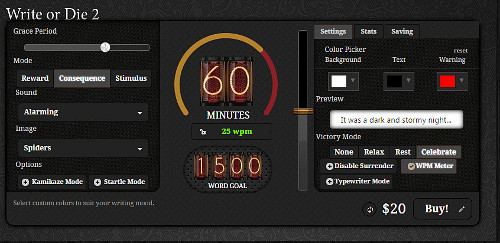November is fast approaching and all writers know exactly what that means! Dishes piling up in the sink, laundry left unwashed, and crazy, manic (and sometimes panicked!) writing sprints at all hours. Also, coffee. Lots of coffee.
Without going into too much detail (because you can check out all the info on their website), National Novel Writing Month runs the span of November each year. Writers, both novice and pro, put their butts in their chairs, their fingers on their keyboards, and bang away in order to win the personal challenge of writing a 50,000 word novel in 30 days.
Yes, we might be a little bit insane. But, man, does it feel great on November 30, when you’ve got 50k words on the page. It’s a huge and worthwhile accomplishment.
There are a lot of fantastic posts about getting ready for NaNo by doing character sketches, outlining, plotting, etc., now, in October. But let’s talk about getting your mind ready for NaNo. Because that is just as important (maybe more so) as all the writing prep you’ll do.
Getting Into the Mindset
Let’s break it down. To get 50,000 words in 30 days, you must average 1667 words a day. The first step in preparing for NaNo is to accept that. It seems sort of silly to say out loud, but I think sometimes we, as writers, look at the numbers and freak out a bit. Especially those of us who have day jobs, children, and spouses who like to see us every once in a while. So if we simply accept that as a fact of life, much like Google running the world, then when November comes, it will be less intimidating, because it is already part of our worldview.
But…but…but…
“How can I possibly do that much writing in a day?”
“Where will I find the time?”
“What if I get behind???”
Okay, slooooow down. In the words of a wonderful Guide: Don’t panic. Let’s start at the beginning. Accept that you will be writing at least 1667 words per day. And, while we’re at it, let’s also accept that there may be days that we won’t make our 1667 word count. And that’s okay. Because as long as we’ve got the right mindset, not making the word count a couple days in the month won’t be a big deal. Promise.
I’m a big proponent of practicing something that I want to do well (or do without going completely off my rocker). And we can practice for NaNo too. This is especially important if you’re not already in the habit of writing every day, or have fallen out of that habit. It’s a good idea as well, because it will give us a ballpark of how much time we need to budget for our writing every day.
Tool For Success
Have you heard of Write or Die? If you’ve done NaNo with any regularity, you probably have. But if you haven’t, check it out. It’s free to use on the website, or you can kick $20 over to the developer for your very own desktop copy.

Photo captured from the Write or Die website
So what does this nifty little program do? It forces you to write. There are lots of different settings, but the basics are that you input how much time you want to write (I generally do 10-15 minute sprints) and the number of words you want to accomplish in that time period (for me, 300-500, depending on how ambitious I am) and what your punishment is for not writing.
Yes. I said punishment. When you start the timer, it gives you a screen in which to type and you go to town! But here’s the incentive: Write or Die reacts when you stop typing. You can fiddle with the settings and set what it actually does when you stop, but initially, the screen turns pink… and then red … and if you don’t start typing, it will do something obnoxious. It could be as innocuous but annoying as blaring loud sounds until you resume typing, or slapping an ugly spider up on your screen. Or… if you’re really badass with your settings… it will eat your words. Scary, huh? Well, keep writing!
So, remember I mentioned practice up there? Get over to Write or Die and set it up the way you want it (the web version isn’t as robust as the desktop version, so if you want more options, pony up the cash). Now, it’s against the rules to start your novel (or whatever project you’re doing for NaNo) before November, so we’re not going to write on the story, since it’s too early. But we can work on our character sketches and character backgrounds. So think of a scene from your character’s life pre-novel, and we’ll use that for our practice. Maybe a pivotal event from her or his childhood. Maybe the breakup of a previous relationship. You pick.
Aside from shutting up my internal editor (more on that later) and getting words on the page, Write or Die helped me to realize that I write a lot faster than I think I do. I’ve found that when I know what I want to write (that’s sometimes the hardest part!), I can belt out 500 words in fifteen minutes. Now, that’s going balls to the wall and being completely in the zone. But I also learned that I generally average about 400 words in fifteen minutes. So do the math. That’s 1600 words in an hour. Or, more precisely for me anyway, 1600 words in four sprints. That’s almost my entire word count for the day!
So use Write or Die to figure out what your average word count for a short sprint is. Once you know that, you’ll know how many short sprints to do during your day.
The Time to Write
And that brings us to when you write. A lot of folks, particularly new writers, think that you must have a big chunk of time in which to write and that if you don’t have that time, you don’t have time to write. So then you don’t write. Does that sound familiar? I believed this for a very long time too.
But the truth is that you can write in any chunk of time. Fifteen minutes before work. Twenty minutes during lunch. Ten minutes in the car, waiting to pick the kids up from school. Thirty minutes before bed. If you can get bigger chunks, that’s great. But if you can’t, write in the time that you do have. You might note that the times above equate to about an hour and a quarter — more than enough time to get all your words if you average 350 words in fifteen minutes. Hint: this is how a LOT of the pros do it.
Ten minutes in the car, waiting to pick the kids up from school. Thirty minutes before bed. If you can get bigger chunks, that’s great. But if you can’t, write in the time that you do have. You might note that the times above equate to about an hour and a quarter — more than enough time to get all your words if you average 350 words in fifteen minutes. Hint: this is how a LOT of the pros do it.
Did you do a couple sprints? Go ahead. I’ll wait.
Send Your Internal Editor to Tahiti
I don’t know about you, but that red screen really makes me write. I get stressed out when it starts to darken, so I stop thinking about the writing and start actually doing it. Did you find that your Internal Editor (IE) took a bit of a back seat during your sprint? That’s because there really isn’t time to engage with your IE, I think. In my case, she takes a break while I’m doing Write or Die. But once the sprint is done, she’s back, making comments on what I just wrote.
So Write or Die can keep that Internal Editor at bay while you’re writing. When you’re done with your Write or Die sprint(s) though, that’s when you have to really make a choice. If you have enough time and energy to edit every day that you write, you can do that. Do what works for you. If you do, I’d suggest doing the editing after you’ve completed all your writing for the day. Because when you edit, you’re engaging the analytical side of your mind, not the creative side. And a lot of people (me included) can go from creative to analytical without much problem. But going analytical to creative can be a lot more challenging.
If your time is limited or you’d rather spend the extra time you do have writing, rather than editing (and I recommend this strongly), then you have to consciously tell your IE to take a vacation.  Beach vacation, ski vacation… it doesn’t matter. Tell your IE to have a good time without you.
Beach vacation, ski vacation… it doesn’t matter. Tell your IE to have a good time without you.
You’re essentially setting a boundary for your Internal Editor and holding her to it. And here’s the big secret to making this work: When you’re done with your writing for the day, put it away. Don’t look at it again unless you plan to write more. And even then, only read the last page or so, to get you back to the place you left off. There will be plenty of time to read it and change things in December. And January. And February. Plenty of time!
Tips to Keep from Getting Behind (and how to handle it if you do)
1. Energy is always highest at the beginning of November, so try to exceed your word count by 200-500 words a day, if you can. Honestly, do this on any day that you’re writing. Even if you exceed by only 50, that will help for the days where you just can’t get all your words, or you’re sick, or your kid dumped all the detergent in the dishwasher and you have a soapy flood in your kitchen. You know. The normal days.
2. Do not kill yourself with guilt if you don’t get your words one day. This is completely counterproductive, because all it will do is weigh you down. Accept that you missed your word count and resolve to do better in the coming days. And then do better.
3. If you do get behind, don’t try to get caught up on all your behind words the next day. Instead, divide your behind words up among the next few days. Getting 2100 words is a lot easier — and much more realistic for most of us — than getting 3334. And if, instead, you get 2500 words or even 3334 words, then you’re getting caught up even faster! The point is: don’t set your bar so high that there’s not much chance of you reaching it. You want to set yourself up to win, not fail. So spread those behind words out.
And the most important tip:

How about you? Are you doing NaNo this year? Do you have any tips and tricks to get into the right mindset? To make sure you get your words? To get back on track after getting behind? Leave your comment below!


I am pumped for NaNo this year! I’m excited about my novel idea, and I’ve been spending a lot of time just thinking about the places that I could go with it. I didn’t end up doing NaNo last year, as I was working on another project, but I’ve manage to win the five times I’ve participated so far.
I agree that getting ahead early is really important (Back when I was young, energetic college student I even stayed up until midnight the night before so I could get my first writing session in!). For me, it has to do a lot with the fact that writing every single day in November is just not feasible. I have two Thanksgivings to attend this year- one which involves a bit of travel- and I know that’s going to trip me up. As a result, I actually set my daily word count goal at 2,000. I don’t always achieve it, but forming a cushion is always a good idea for me.
Also, another thing that’s helpful for me is learning to think more like a plotter. I’ll always be more of a pantser. Sitting down and outlining the whole book has never worked for me, but having a clear image in my head of what I’d like to write for the next few sessions makes the writing go a lot faster (and it’s more enjoyable too!).
It sounds like you’ve got a good handle on things, Nancy! I totally agree with the plan of setting a higher word goal if you know there’s going to be a lot of down days. It’s so important to get ahead as much as you can (even in general), because there will *always* be days where we don’t make our count.
Good luck!
I have never managed Nano just because I’m always in the middle of some project, as well as sliding into retail hell. But every year, I dream!